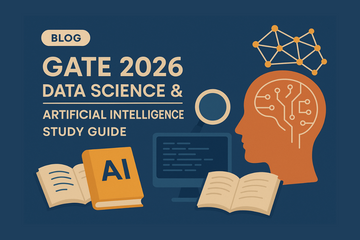The Graduate Aptitude Test in Engineering (GATE) is one of the most prestigious competitive exams in India, opening doors to postgraduate programs (M.Tech/M.E/PhD) and lucrative job opportunities in leading Public Sector Undertakings (PSUs). Over the years, GATE has expanded to include cutting-edge fields, and one of the most exciting additions in recent times is Data Science and Artificial Intelligence (DA&AI).
With industries becoming increasingly data-driven and AI powering everything from recommendation systems to self-driving cars, the inclusion of this stream highlights the demand for professionals skilled in these technologies. For aspirants aiming to crack GATE 2026 in Data Science and Artificial Intelligence, a proper strategy and the right resources are crucial.
In this blog, we’ll walk through everything you need to know about GATE Data Science & AI 2026 –the exam pattern, syllabus, preparation strategies, and how GK Publications comprehensive book, GATE 2026: Data Science & Artificial Intelligence – Study Guide, can help you become exam-ready.
Why Choose GATE Data Science & Artificial Intelligence?
Before we dive into preparation, let’s understand the significance of this specialization:
- Rising Industry Demand: Data Science and AI professionals are among the most sought-after worldwide. In India, roles such as Data Scientist, AI Engineer, and Machine Learning Specialist are consistently in high demand with salaries averaging between ₹10-20 lakhs annually for experienced professionals.
- Expanding Research Opportunities: Pursuing postgraduate studies through GATE allows you to engage in research projects on advanced AI models, deep learning frameworks, and big data applications. This is an excellent pathway for those aiming for R&D roles in academia or industry.
- PSU Recruitment: Many PSUs recruit candidates through GATE, and with AI-driven projects gaining importance in defense, healthcare, and national infrastructure, opportunities are only expected to grow.
- Global Career Prospects: With GATE scores accepted by some international universities, candidates also gain a chance to pursue higher education abroad.
GATE 2026 Data Science & AI – Exam Structure
The exam follows the standard GATE format but focuses on Data Science and AI-related subjects.
· Duration: 3 hours
· Mode: Computer-Based Test (CBT)
· Total Marks: 100
· Number of Questions: 65 (MCQs, MSQs, and Numerical Answer Type)
Section-wise Distribution:
1. General Aptitude (15 marks): Tests basic reasoning, language, and numerical skills.
2. Engineering Mathematics (13 marks): Includes linear algebra, probability, statistics, calculus, and optimization.
3. Core Data Science & AI Subjects (72 marks): Focused on programming, algorithms, databases, ML, AI models, deep learning, and big data.
This makes the exam both broad and in-depth, demanding practice across concepts and problem-solving skills.
Key Topics in the Syllabus
Here are the major areas aspirants must cover for GATE DS & AI:
· Programming & Data Structures: C, Python, complexity analysis, trees, heaps, graphs.
· Databases: ER modeling, relational algebra, SQL, normalization, indexing.
· Algorithms: Dynamic programming, divide-and-conquer, greedy algorithms.
· Mathematics: Probability distributions, random variables, regression, matrices.
· Machine Learning: Supervised & unsupervised learning, neural networks, decision trees, SVM.
· Artificial Intelligence: Search algorithms, planning, natural language processing (NLP), reinforcement learning.
· Big Data & Cloud: MapReduce, distributed file systems, Spark basics.
· Deep Learning: CNNs, RNNs, transformers, generative models.
The vastness of this syllabus highlights the need for a structured and reliable resource to simplify preparation.
Preparation Strategy for GATE 2026 Data Science & AI
Cracking GATE requires more than just studying—it requires a smart, disciplined approach. Here’s a step-by-step plan:
1. Understand the Syllabus Thoroughly
Go through the official syllabus and identify your strengths and weaknesses. For instance, if you’re comfortable with programming but less confident in engineering mathematics, allocate more time accordingly.
2. Build Conceptual Clarity
Rather than rote learning, focus on understanding the “why” behind concepts. For example, don’t just memorize SQL queries—understand normalization and indexing principles.
3. Practice Extensively
Since GATE is application-based, practice is the key. Attempt topic-wise problems and gradually move to full-length tests.
4. Analyze Previous Year Papers
Solving past year papers provides insights into exam trends and helps you manage time better. Pay attention to frequently repeated concepts and the level of difficulty.
5. Mock Tests & Self-Evaluation
Attempt timed mock tests to simulate real exam pressure. Analyze errors after each test and refine your preparation strategy.
6. Revise Regularly
Make concise notes for each subject. In the last 30 days, revision has become crucial. Focus on formulae, shortcut tricks, and important problem-solving techniques.
Recommended Book for Preparation: GK Publications’ GATE 2026 Study Guide
While multiple resources are available, not all are tailored specifically for GATE Data Science & AI. This is where GK Publications’ book makes a difference.
GATE 2026: Data Science & Artificial Intelligence – Study Guide
This book has been designed keeping in mind the exact needs of aspirants. Here’s why it’s a must-have:
Key Features:
· All-in-One Coverage: Covers every section—General Aptitude, Engineering Mathematics, and Technical Subjects.
· 2600+ Practice Questions: A massive collection of MCQs & NTQs for rigorous practice.
· Solved Papers (2024 & 2025): Real exam questions with detailed solutions to give you exam familiarity.
· Topic-wise Exercises: Questions are placed after every concept to reinforce learning.
· Structured Explanations: Simplifies even the most complex topics for easy understanding.
This makes the guide not just a study companion, but a complete preparation roadmap.
How to Use GK Publications’ Book Effectively?
1. Start with Concepts: Begin each topic by going through the detailed explanations.
2. Practice After Learning: Attempt the exercises after every chapter to cement your understanding.
3. Focus on Weak Areas: Use the solved papers to identify weak topics and revisit them.
4. Timed Practice: Attempt MCQs and NTQs within set time limits to simulate real exam conditions.
5. Revision Aid: Towards the end, use the exercises and summaries as a quick revision tool.
Additional Tips for Success
· Balance Speed & Accuracy: Don’t just aim to solve problems fast—ensure accuracy. Negative marking can cost heavily.
· Stay Updated: AI and Data Science are evolving fields. Keep an eye on recent trends like transformer models, LLMs, and ethical AI.
· Peer Discussions: Join online study groups or communities to share doubts and learn collaboratively.
· Health & Focus: A sharp mind requires a healthy body. Maintain regular sleep and exercise routines.
Career Opportunities After GATE in Data Science & AI
Cracking GATE in this specialization opens multiple pathways:
1. Postgraduate Studies: Admission to IITs, NITs, and leading institutes for advanced degrees.
2. Research Roles: Opportunity to work on cutting-edge AI projects in universities or industries.
3. PSU Jobs: Government organizations increasingly require AI solutions for large-scale problems.
4. Private Sector Careers: Roles such as Data Scientist, AI Engineer, and Machine Learning Specialist are booming in companies like Google, Microsoft, Infosys, and TCS.
Final Thoughts
Preparing for GATE 2026 in Data Science & Artificial Intelligence requires clarity, consistency, and the right guidance. The syllabus is vast, but with a structured plan, continuous practice, and the support of a comprehensive book like GK Publications’ GATE 2026 Study Guide, success becomes attainable.
This guide not only provides 2600+ MCQs & NTQs but also ensures you’re aligned with the latest exam trends through solved papers from 2024 and 2025. Whether your goal is to pursue higher studies in top institutes or secure a prestigious PSU role, this book equips you to face the challenge with confidence.
So, start early, stay consistent, and make GK Publications Study Guide your preparation partner to ace GATE 2026 in Data Science & AI.








dg2n0j
5ufc9q
6o9qwe